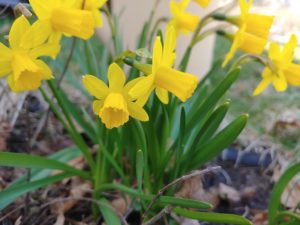Once I spoke the language of the flowers,
Once I understood each word the caterpillar said,
Once I smiled in secret at the gossip of the starlings,
And shared a conversation with the housefly
in my bed.
Once I heard and answered all the questions
of the crickets,
And joined the crying of each falling dying
flake of snow,
Once I spoke the language of the flowers….
How did it go?
How did it go?
[Shel Silverstein, Forgotten Language, Where the Sidewalk Ends; New York: HarperCollins, 1974, p. 149]
I don’t know if it’s so much forgetting the languages as it is forgetting that each form of life has its own life and language. It’s one of the reasons I love spending time in the garden and walking in woods, on beaches, and down the familiar streets of this town I call home: my selfish deafness to the languages of non-human life is lifted, if just for a few minutes.

